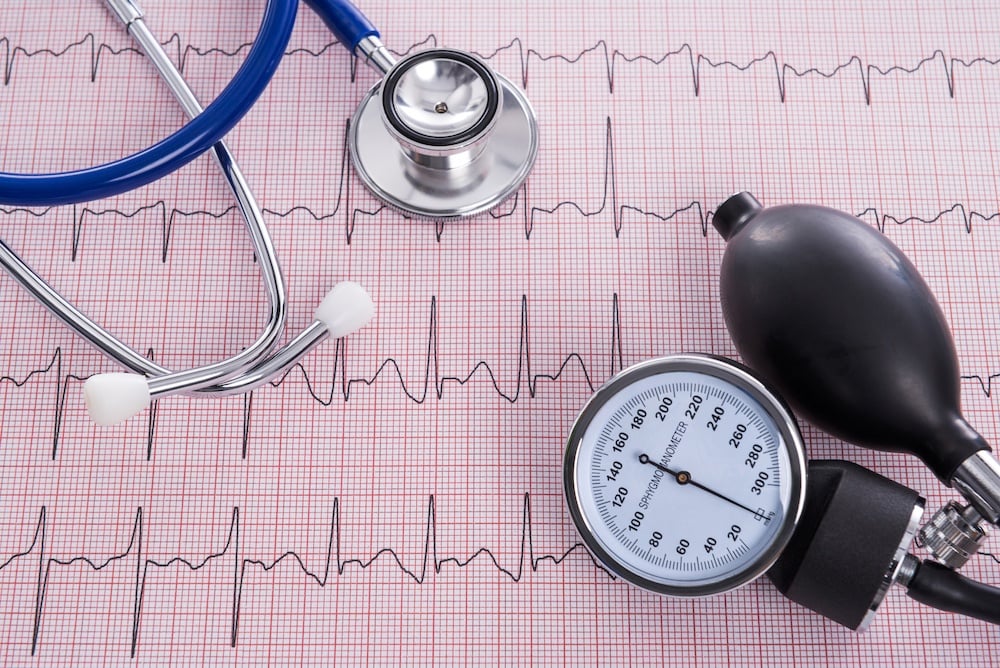
High blood pressure is a top concern for many Americans, as it can lead to a number of life-threatening ailments. With that in mind, many want to know: Can high blood pressure cause heart disease? Find out how high blood pressure impacts the heart, plus ways to prevent high blood pressure, ahead.

High blood pressure can lead to a number of ailments, including heart disease. | RTimages / iStock / Getty Images
Can high blood pressure cause heart disease
High blood pressure — specifically hypertension — can wreak havoc on your heart. Not only is it one of the leading factors of heart disease, but it also can lead to issues such as thickening of the heart muscle (left ventricular hypertrophy) and heart failure.
Ways to prevent high blood pressure without medication
High blood pressure can lead to some scary health issues. However, so can its medication. According to Medical News Today, scientists in Salt Lake City, Utah found that patients prescribed alpha blockers and alpha-2 agonists for blood pressure are at a higher risk of blood pressure variability — which could increase fatality risk. In addition, some blood pressure medications have been linked to cancer and other harmful conditions.
Fortunately, blood pressure medication is not the only option. In fact, there are some ways to prevent high blood pressure naturally — all of which have to do with lifestyle. Here are some things you can do to lower high blood pressure:
Exercise regularly
When it comes to high blood pressure and heart disease, exercise can save your life. According to the Mayo Clinic, “regular physical activity — such as 150 minutes a week, or about 30 minutes most days of the week — can lower your blood pressure by about 5 to 8 mm Hg if you have high blood pressure.” However, consistency is key, otherwise, you run the risk of blood pressure rising again.
Cut back on sodium
Diet is an important factor in lowing high blood pressure naturally. And, one thing to look out for is your sodium intake. But, unfortunately, it’s hidden in many foods. That said, making a conscious effort to reduce sodium in your diet can be ultra-beneficial. According to the Mayo Clinic, even just a small decrease of sodium can help lower blood pressure by five to six mm Hg.
To cut back on sodium, steer clear of particularly salty foods like processed meat (aka, deli meat). In addition, be sure to read the packaging. Limiting sodium intake to 2,300 mg is considered safe — however, a lower intake of 1,500 mg a day is most ideal.
Eat a healthier diet
Speaking of diet, what you eat can play a key role in your health — especially if you have high blood pressure. “Eating a diet that is rich in whole grains, fruits, vegetables, and low-fat dairy products and skimps on saturated fat and cholesterol can lower your blood pressure by up to 11 mm Hg if you have high blood pressure,” notes the Mayo Clinic.
Reduce caffeine intake
That extra cup of coffee might have a lasting impact on your health. In addition to reducing sodium, experts also suggest consuming less caffeine, as it can cause your blood pressure to rise. That said, caffeine impacts everyone differently. Case in point: Those who rarely consume caffeine experience a blood pressure spike of 10 mm Hg. And, those who drink it on a regular basis experience very little (if any) effect.
With that in mind, caffeine isn’t the most harmful thing for high blood pressure. However, its long-term effects aren’t as well known and doctors suspect that over time it can impact blood pressure levels.
Manage stress
Stress is another big one — and, the Mayo Clinic says no matter how often you experience it, stress can contribute to high blood pressure. If you feel stressed or are prone to chronic stress, take some time for yourself. Identify the source of your stress and come up with a way to reduce its impact on your mental (and physical) health. Some ways to cope with stress include yoga, meditation, hiking, listening to relaxing music, taking a bath, and more.
Quit smoking
Smoking is the source of many health issues, including high blood pressure. Every time you smoke a cigarette, your blood pressure levels spike for many minutes after you’re done. If you stop smoking, your blood pressure will turn back to normal and thus reduce the risk of high blood pressure and heart disease.
Check out The Cheat Sheet on Facebook!
Source: Read Full Article